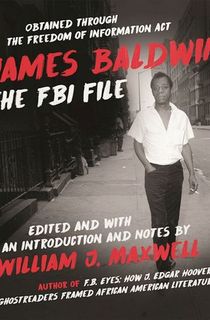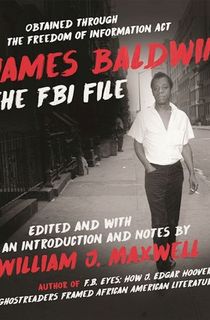Since its conception in 2013, the Black Lives Matter (BLM) movement has lead a nationwide dialogue about systemic racism in America. Now one of the most powerful social movements since the mid-20th century, it has attracted its fair share of dissenters—least of all the government itself. Back in 2015, journalists revealed the FBI was monitoring BLM leaders and activists, believing some were becoming "black identity extremists." While rightfully upsetting and unsettling, this is hardly a new phenomenon—but something that dates back decades, even centuries.
As writer William J. Maxwell notes in the introduction of his book, this BLM monitoring bears a striking resemblance to the relationship between If Beale Street Could Talk author James Baldwin and the FBI. Baldwin is something of a patron saint for the movement, though the BLM connection goes beyond the resonance of his work—honest, eloquent, and controversial representations of the black experience—and includes FBI counterintelligence. A left-leaning queer black man unafraid to speak or write his mind, Baldwin was an obvious choice for the FBI's author surveillance program. But his alleged associations with the Communist Party, and his passionate civil rights activism, set him further apart from targets like Truman Capote and Henry Miller. Between the 1950s and 1974, the Bureau prioritized Baldwin—ultimately producing a whopping 1,884-page dossier that tried to paint him as an "Independent Black Nationalist Extremist." It's a mishmash of information gleaned from stalking his movements and tapping his phone conversations—some of it true but much of it false.
Related: 10 Unapologetic Books About Race in America
Baldwin's file wasn't available to the public until 1998, though it's now the subject of William J. Maxwell's fascinating 2017 exposé. In it, the American Book Award winner dissects the thousands of letters, transcriptions, and photographs that resulted from this decades-long period of surveillance, exposing the illegal lengths to which the government went to catch their man. But if the following excerpt is anything to go by, the FBI's efforts did little to silence Baldwin or prevent him from fighting for justice...
BALDWIN BAITS J. EDGAR HOOVER—AND BUREAUCRATIC HELL BREAKS LOOSE, September 1963
In late September 1963, the Bureau finally received confirmation of the criticism from Baldwin it had anticipated for months. During both a press conference and a television appearance, the writer charged out loud that the FBI was a hazard to the Civil Rights Movement and that Hoover effectively placed the awesome power of the Justice Department on the side of the segregationists. This “letterhead memo” detailing Baldwin’s accusations, likely based on the Clarence Jones phone tap rather than on a human confidential source, was originally held as highly secret, its exposure considered a threat to the “national defense.” Its contents disclose that Baldwin and Jones were livid about the decision of the United States Information Agency (USIA) to delete Baldwin’s negative comments on the FBI from the transcript of a government-sponsored television program. “[A]ny legitimate critical opinion of the FBI is apparently ‘off limits or taboo,’” Jones protested. Baldwin’s critical opinion of the Bureau came through more clearly at an uncensored New York press conference. The letterhead memo quoted Baldwin’s confession there that he “blame[d] J. Edgar Hoover in part” for the Birmingham church bombing, and that African Americans in general had “no cause to have faith in the FBI.” More than fifty years on, it is difficult to recapture just how rare—and just how courageous—such public criticisms of the Bureau were. Baldwin’s words preceded King’s risky 1964 complaint that the FBI was “completely ineffectual in resolving the continued mayhem and brutality inflicted upon the Negro in the Deep South.” They outstripped the long tradition of cat-and-mouse exchanges between black writers and the Bureau launched during the Harlem Renaissance. And they rocketed Baldwin, in the mind of Hoover’s FBI, to the status of genuine national security threat.
...it is difficult to recapture just how rare—and just how courageous—such public criticisms of the Bureau were.

Having tapped a conversation between Baldwin and Clarence Jones (counsel to Martin Luther King), the FBI reports that Jones threatened to tell the public about the omission of Baldwin's criticism of Hoover from a television program.
Photo Credit: Skyhorse Publishing
The FBI details further information about Jones and Baldwins' discussion regarding the Birmingham bombing, the inefficacy of the Kennedy administration, and the "crisis" in the non-violent movement: "Negroes are thinking seriously of assassinating Martin Luther King."
Photo Credit: Skyhorse PublishingPHOTOS OF BALDWIN IN SELMA, October 1963
Baldwin put his body as well as his words on the line in October 1963, jumping directly into the civil disobedience at the heart of the nonviolent Civil Rights Movement. After the Birmingham church bombing that September, sit-ins and voter registration efforts intensified in nearby Selma. SNCC leader James Forman (his last name often misspelled by the FBI) called on Baldwin and comedian Dick Gregory to travel to Alabama to add celebrity glitz to a “Freedom Day” on October 7, during which three hundred African American citizens of voting age would attempt to register at the Dallas County Courthouse. The FBI had advance knowledge of Baldwin’s involvement: as this October letter to the Justice Department testifies, the Bureau learned of his arrival at the Birmingham airport through both the Clarence Jones wiretap and a less secretive NBC television report. Baldwin speechified on the big day but also lined up side by side with the protestors, where he saw, at first hand, FBI agents refuse to intervene as Sheriff Jim Clark beat and arrested several would-be voters. Years later, Baldwin recalled asking an FBI representative on the scene if the sheriff—a man whose moral life seemed to be “destroyed by a plague called color”—had “any right to throw us off Federal property. No, is the answer, but we can’t do anything about it.” Baldwin was incensed by this passivity, further ammunition for his war on the FBI’s racial bias. Had Baldwin seen the indistinct black-and-white photographs of him and Forman and other protestors taken by a Bureau agent on Freedom Day, he would have been even angrier. Collecting images of those in the “voter registration line in front of the Dallas County Courthouse” appeared to take precedence over investigating their tormentors.”
Related: 10 Books By Iconic Authors That You Might Have Missed
Baldwin put his body as well as his words on the line in October 1963...

Regarding Baldwin's "Communist Influence in Racial Matters," this document notes that "Clarence Jones expressed concern over James Baldwin . . . travelling to Birmingham, Alabama."
Photo Credit: Skyhorse Publishing
Left: Baldwin "was deeply concerned" when his contact did not meet him upon his arrival in Birmingham. Right: A description of the photos taken of Baldwin in a Birmingham voter registration line (see below).
Photo Credit: Skyhorse Publishing
Top Left: Entrance of Dallas County Courthouse before voter registration line formed; Top Right and Bottom Row: James Foreman (SNCC leader) and James Baldwin attempt to enter the courthouse.
Photo Credit: Skyhorse PublishingWant to keep reading? Download James Baldwin: The FBI File today.
This post is sponsored by Open Road Media. Thank you for supporting our partners, who make it possible for Early Bird Books to continue publishing the book stories you love.
Featured photo of James Baldwin: Alchetron


